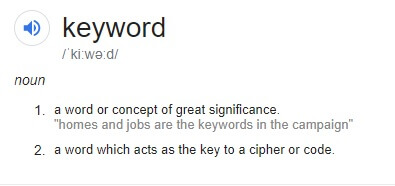Intern’s Guide to Keyword Research
People search the internet every day for things such as read articles, watch videos, browse, gather information and even shop online. A big slice of what makes your search results that appear on your screens is based on the words you used to type into the search engine. Let’s take a deeper look at the topic of keywords and keyword research.
What is a keyword?

A keyword refers to the actual words or phrases typed into a search engine. The more specific your keyword is when typing into the search engine, the more relevant the information will be regarding your topic of search. For example, if you’re based in Cape Town looking for a photographer, who specialises in wedding photography, your keyword search should look something like,” wedding photographer near me” or, “wedding photographer Cape Town.” You’ll find that the results page is where all wedding photographers based in Cape Town are listed according to your search.
Types of keywords
There are two types of keywords used in the world of digital marketing; longtail keywords and short-tail keywords. The difference refers to the number of words used in a search. Longtail keyword searches are often used by people looking for something very specific and are more likely to find exactly what they have intently searched for, which could lead to a possible conversion such as an email subscription, an enquiry, a repost or online purchase.
An example of short-tail keyword searches are searches that are extremely broad as they consist often of 3 or fewer words or phrases, for example, “freelance photographer”. On the other hand, an example of a longtail keyword search would be,” freelance wedding photographer packages for December Cape Town”. To make sense of this, the words used before and after “freelance photographer” are what makes the search more specific to what the searcher is searching for. Without these words specifying your search, Google is more likely to display topics that may have similarities to your search than what you’re intending to find.
For business, you’d want to add these “adjective” keywords to Google search ad campaigns and optimise them on your site to ensure your target audience is reached and more traffic to your website is achieved.
Importance of keyword research for businesses

For companies to appear on the results page, keywords on websites should both be relevant and optimised to what potential customers may be searching for. When choosing the right keywords to optimise, it is important to focus the keywords to an existing landing page of the company’s website where those words and services are displayed. Let’s use this scenario as an example; someone searches for a wedding photographer to hire and decides to click on your site shown in the results listing, but the landing page loads images of landscapes and cars, and there is no mention or imagery of wedding photography. There is a good chance that potential clients will leave the site since they did not immediately find what they were looking for.
Tools to use keywords and keyword research in digital marketing
Google allows you to use tools such as Google Ads and Google keyword planner to make campaigns that will help allow for your website listing to appear on the first page and appear as one of the top listings. It’s important to keep in mind that besides keywords, there are other factors that can influence the listing positioning however, we’re only talking ‘keywords’ here. Google Ads’ keyword planner gives you a peak at what people are typing into search engines when they’re looking for something. YES, Google gifts you with this information, you just need to know how to use it. This data can display:
- how many people type in words relevant to your website
- exactly which words are more commonly used than others
- whether there’s competition for these words in Search ads
- the current cost per click the keyword is
As a business, this information can be used to adjust your website content to attract your desired audience based on what they search for. Your business can run Ad Campaigns using this data to generate traffic to your website. Just by knowing how well to use keywords and keyword research you can have confidence that your website will be listed when customers search for your product or service which a higher possibility to receive clicks.
In conclusion, keywords are the fundamental tools for enhancing your company’s online presence in search engines and keyword research data is easy to obtain through Google Keyword Planner. The search results are dependent on how specific and relevant the keywords are according to your company’s website and search ads. Longtail keywords are directed towards an intent search as opposed to short-tail keywords which allow more options for search results. Paying close attention to your choice in keywords can be beneficial to both the searcher and company.
